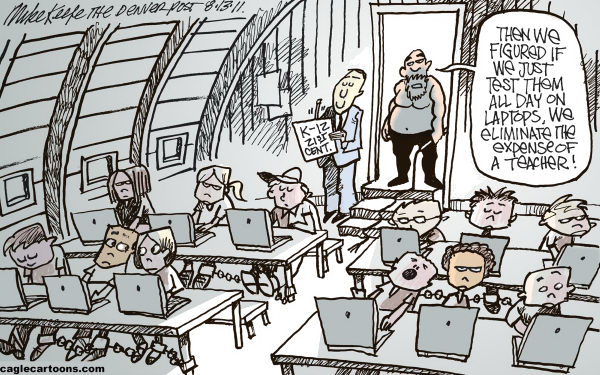What About Romney’s Education Plans?
They're Online

In our highly praised age of information infinities, educated citizens ought to be able to learn about presidential candidates with ease, and learn about their specific views on important questions of the day. Few questions of national import rival the problem and promise of public education in America today.
The United States needs a much better system of public education than it now has. Our American children deserve a superior — no! a great — public education. In an age of globalization, as we hear so frequently, our daughters and sons will compete for good jobs and positions with the best and brightest from the whole world. However, so many international tests confirm the decay of American public education that we need not debate this depressing fact.
Our young people — their health and intelligence, and their educational training — are our greatest source of “capital.” Today we shamelessly gut public education funding, trash the teachers, ignore decrepit buildings, and try to find ways to amend the teachers’ public pensions. Teachers, like firefighters and cops, know that “reform” means cut.
In this climate, it seems important to ask what presidential contender Mitt Romney and his team say about the sorry state of public education in these United States. While Paul Ryan’s education plan has gotten scrutiny, let’s look at Mitt’s.
Harnessing the power of the Internet and Google Chrome, I looked up the ex-governor’s white paper, A Chance for Every Child, May 23, 2012 (scroll down to A Chance for Every Child). At 34 pages it was quick to print, and, like a thoughtful citizen and longtime teacher, I’ve carefully studied Mr. Romney’s ideas.
Early on in Romney’s white paper (page 4), he concedes the pathetic state of public education today: “Sadly…across the nation, our school system is a world leader in spending yet lags on virtually every measure of results.” It’s true, and actually tragic.
A Chance for Every Child contends, remarkably, that no new funds are needed for public education in America. “Mitt Romney understands that more spending is the last thing our schools need.” (Page 34). Mitt presumably would not vote for Proposition 30, a tax to help schools in California.
What is needed, according to the Romney playbook, is a redirection of the monies the states and the federal government already spend on education: He wants more taxpayer money to go to on-line education, especially for-profit colleges, as well as charter schools and school vouchers. (However, since vouchers have been rejected throughout most of the nation, A Chance for Every Child never uses the term “voucher,” just constantly implies it.)
I have been teaching for over 40 years in a variety of educational environments, from Germany to California, both elementary schools and colleges, both public and independent (private non-profit). There are indeed genuine advantages to certain forms of on-line education, but the drive to move public education online comes from a private industry that has largely bought the Romney camp.
A Chance for Every Child is wonderfully clear in stating again and again how this new president would “Welcome Private Sector Participation Instead of Pushing It Away” (bolded throughout). In two places, the following ritual phrase has been pasted-in, as if the reader was not sure the writer was totally committed: As president, Romney would “welcome private sector participation in providing information, financing, and the education itself.” Also, he would call for “supplemental tutoring or digital courses from state-approved private providers.”
Candidate Romney makes it very clear that privatizing American education is his primary goal, and remaining educational tax dollars would go to for-profit on-line schools and privatized charter schools like Green Dot. Wall Street and private Bain-like corporations can even take over “the education itself.” If parents belong to the 1% or the 5%, then they can afford top-tier private schools like Harvard-Westlake, Cate, Stanford, and Yale. The 60% will have to make-do with privatized on-line instruction.
For writing, team Romney gets a B; for political suasion they earn a B+; and for content a courtesy D-. There are no significantly new reforms in this document, unless you think turning public education over to private corporations will improve student learning.



